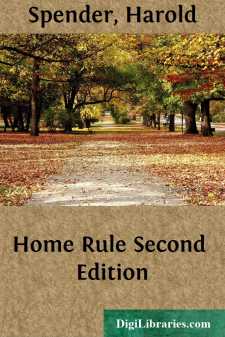Categories
- Antiques & Collectibles 13
- Architecture 36
- Art 48
- Bibles 22
- Biography & Autobiography 813
- Body, Mind & Spirit 142
- Business & Economics 28
- Children's Books 15
- Children's Fiction 12
- Computers 4
- Cooking 94
- Crafts & Hobbies 4
- Drama 346
- Education 46
- Family & Relationships 57
- Fiction 11828
- Games 19
- Gardening 17
- Health & Fitness 34
- History 1377
- House & Home 1
- Humor 147
- Juvenile Fiction 1873
- Juvenile Nonfiction 202
- Language Arts & Disciplines 88
- Law 16
- Literary Collections 686
- Literary Criticism 179
- Mathematics 13
- Medical 41
- Music 40
- Nature 179
- Non-Classifiable 1768
- Performing Arts 7
- Periodicals 1453
- Philosophy 64
- Photography 2
- Poetry 896
- Political Science 203
- Psychology 42
- Reference 154
- Religion 513
- Science 126
- Self-Help 84
- Social Science 81
- Sports & Recreation 34
- Study Aids 3
- Technology & Engineering 59
- Transportation 23
- Travel 463
- True Crime 29
Home Rule Second Edition
by: Harold Spender
Categories:
Description:
Excerpt
CHAPTER I.
Very nearly a generation of time has elapsed since, in 1886, Mr. Gladstone expounded in the British House of Commons his first Bill for restoring to Ireland a Home Rule Parliament. Nearly twenty years have passed since that same great man, indomitably defying age and infirmities in the pursuit of his great ideal, passed the second Home Rule Bill (1893) through the British House of Commons. That Bill stands to-day unshaken in regard to all its vital clauses. Some of us still hold the faith that that Bill would, if it had become law in 1893, have saved Ireland from many years of wastage, and would have built up, to face our enemies in the gate, a stronger and stouter fabric of Empire.
The Bill of 1893 only survived the perilous tempests of the House of Commons to fall a victim to the House of Lords.
Nearly twenty years have elapsed since that day, and now the successors of Mr. Gladstone, the Progressives of the United Kingdom, Liberals, Labour Members and Nationalists, approach the same task with the Bill of 1912. Some of them are veterans of the former strife. They can turn, like the present writer, to the thumbed diaries of that great combat, and can recall the great scenes of that prolonged Parliamentary agony with a sense of treading again some well-worn road. Others are new to the issue, and can only hear, like "horns of Elf-land faintly blowing," some faint echo from the dawn of consciousness.
But young or old, we must again set forth on our travels, and this time—
"It may be that we shall touch the Happy Isles."
It will be the memory of the "Great Achilles" that will sustain us. For this task comes to Liberals as a sacred trust from Mr. Gladstone. It is from him that they have learnt that race-hatred is poison, and that the only true union between nations is—in a phrase that has outlived the silly laughter of the shallow—the "Union of Hearts." It is Mr. Gladstone's work that they design to accomplish. It is the memory of his passionate and sustained devotion through the last twenty years of that glorious life that has thrown a halo round this cause, and still gilds it with a "heavenly alchemy."
But, before we "smite the sounding furrows," our first duty is to survey once more the seas over which we shall have to voyage. We have to consider again both the old and the new "case for Home Rule"—not merely the case of 1886 or 1893, but the still stronger case of 1912.
For the world never stands still, and in every generation every great human problem presents different aspects, and shows new lights and shadows. Every great human question is like a great mountain which on a second or third visit reveals new and unsuspected depths and heights, new valleys and new peaks, slopes which new avalanches have furrowed, and glaciers which have receded or advanced.
Not that the real, great, main outline ever changes. As with the mountains, so with the great human problems; there are always certain great features which remain permanent.
...

